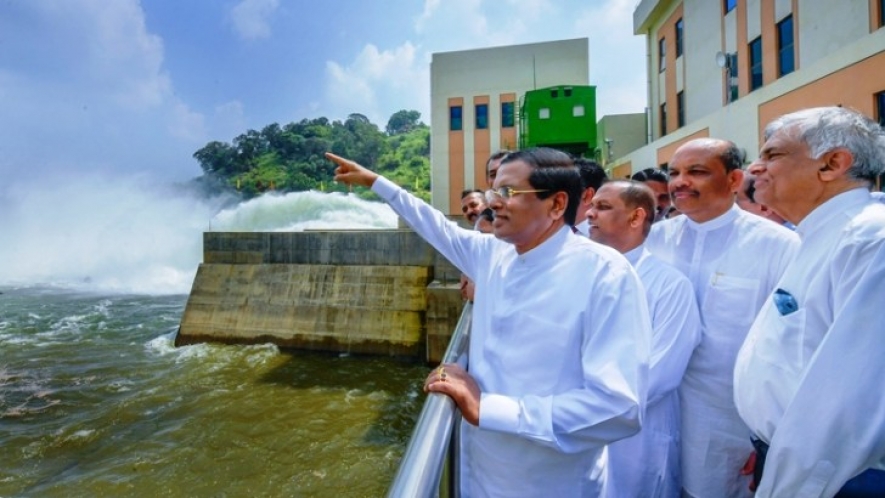A steady ride over troubled waters!
Three years is not a long period in the history of a nation with a proud record of a 25 centuries old civilization. However, it is a fairly significant segment of Sri Lanka’s post independent era of seven decades. The last three year period of our country is best known for good governance, which is a widely used term for proper exercise of authority in managing the resources of a country committed to basic principles of democracy. The good governance is all about making sure that this exercise of power helps improve quality of life enjoyed by all citizens.
The good governance verdict of the people, given on January 8, 2015 and endorsed exactly three years on August 17, 2015 was considered at that time as the most important requirement of the nation as the then government was not providing the quality of life that you think you and your fellow citizens deserve.
The key components of good governance are accountability, effectiveness and fair and equitable justice. Any democratically elected government should be accountable to the people. All citizens should be able to keep track of whether governments followed through its promises made during elections, where the money is coming from, where it goes, who is responsible for carrying out the government functions and last but not the least, is this information available to public.
Another key aspect is to see, if the government delivering services such as education, and health care to citizens in accordance with the needs and if the collecting of revenues is conducted honestly, investing those resources wisely and managing public properties for the benefit of all.
The citizens expect from a government of good governance to be truthful and trustworthy.The government should act in a way so that the people could trust the government, its institutions and the individuals who run them. They have to be fair, reliable, stable, accountable, free of corruption and build trust between citizens and the government.
Democracy restored
Restoration of democracy and strengthening of democratic institutions is the most important achievement of the government since 2015. With the establishment of Constitution Council and all the required Commissions, the Government has largely succeeded in restoring public confidence in state institutions including the judiciary and the police. This was concluded during the first 100 days of the government by enacting the 19th Amendment to the Constitution, which was one of the key election pledges. It set Presidential term limits, pruned certain powers of the Executive Presidency and transferred them to Parliament and restored the independence of government institutions. The government delivered on its core promises.
Delivering the promise on accountability, the Right to Information Act was adopted to ensure transparency of the government. The government has gone a long way in fulfilling the promise on national reconciliation. Release of large segment of military occupied land in the North and East and the establishment of Office of Missing Persons are two such major steps.
One of the allegations against the government in the first three years was that the development benefits were slow to reach the people. However, that accusation is not much heard now as the major development activities have started to produce results. The Grama Shakthi village empowerment movement unleashed by President Maithripala Sirisena has yielded much benefits to the people at grass-roots level. The Public-Private Sectors and the People (PPP) involvement at village level small cottage industries have brought much benefits to the people with buy-back arrangements with major private companies. Recently the Grama Shakthi project received a boost from the complimentary ‘Gamperaliya’ programme initiated by Prime Minister Ranil Wickremesinghe to develop villages.
The homeless in the North and East have vastly benefited from the 50,000 houses distributed in those two provinces. The government has also pledged to establish 2,500 Uda Gammana villages by 2020 to address the housing needs of the people and the results so far show it is well on course to achieve it.
Achievements
One of the significant milestones of long term development activity was the construction of the biggest reservoir of multipurpose Mahaweli Project at Moragahakanda – Kalu Ganga to irrigate parched dry lands in faraway Vanni in the Northern Province on one side and Rajarata, Wayamba, Central and Eastern Provinces on the other as well as to generate hydropower.
It is no easy task to sustain a unity government of two major political parties, who were at each others’ throats for over six decades. Considering the non-cooperative political culture penetrated deeply into the activists of political parties, it is almost a miracle to function together for a period of over three years. President Sirisena and Premier Wickremesinghe deserve the credit for bringing the two parties together and maintaining that unity despite differences of policies and principles.
There were serious differences on major economic policy planning and the two leaders managed to keep the rocking boat of Yahapalanaya steady in these troubled waters. The efforts as well as the magnanimity displaced by the two leaders regarding reestablishment of an economic policy making body last year is highly praiseworthy.
Overall, the three years of Yahapalanaya government was not a bed of roses. However it has succeeded in overcoming massive challenges and taking strides in stabilizing the economy and ushering in steady development that would bring beneficial returns to the people.
What is equally important is for President Sirisena and Premier Wickremesinghe to build on the firm foundation laid during the last three years to show solid results during the next two years before facing the people’s mandate once again.




















